
Azure-OpenAI-demos
Azure AI Foundry (demos, documentation, accelerators).
Stars: 715
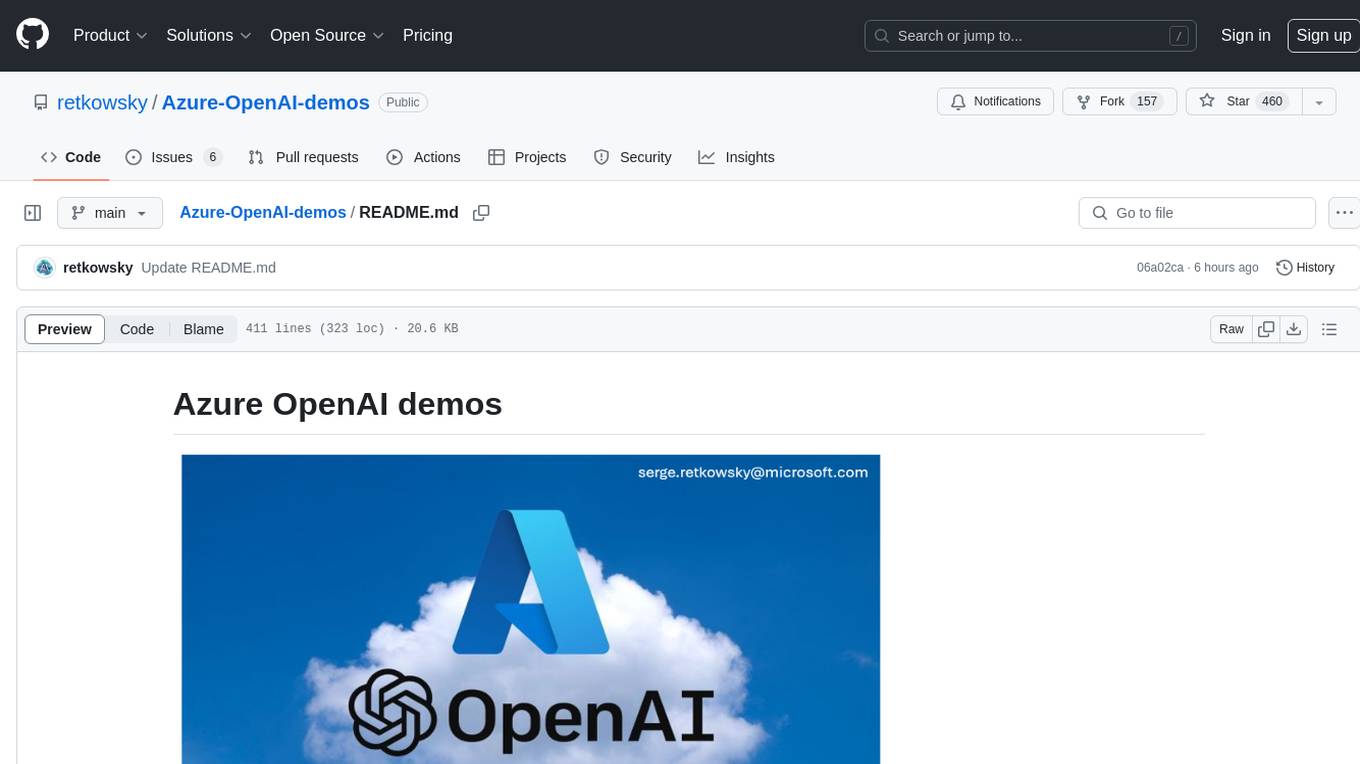
Azure OpenAI demos is a repository showcasing various demos and use cases of Azure OpenAI services. It includes demos for tasks such as image comparisons, car damage copilot, video to checklist generation, automatic data visualization, text analytics, and more. The repository provides a wide range of examples on how to leverage Azure OpenAI for different applications and industries.
README:
🔥New! Flux.1 Kontext Pro - Text & image to image demos
Go to notebook
🔥New! Flux1.1 pro - text to image demos
Go to notebook
🔥New! GPT-5 demos examples
Go to notebook
🔥New! Azure AI Agent service Bing integration (update)
Go to notebook
🔥New! Azure AI Agent service Custom Bing integration
Go to notebook
🔥New! Azure AI Agent service Connected agents
Go to notebook
🔥New! Grok with Azure AI Foundry
Go to notebook
🔥New! Phi-4 reasoning with Azure AI Foundry
Go to notebook
🔥New! GenAI model tracing with Azure AI Foundry
Go to notebook
🔥New! Agents evaluator with Azure AI Foundry
Go to notebook
🔥New! Azure OpenAI evaluators with Azure AI Foundry
Go to notebook
🔥New! Evaluators with Azure AI Foundry
Go to notebook
🔥New! Custom evaluators with Azure AI Foundry
Go to notebook
🔥New! Retrieval evaluators with Azure AI Foundry
Go to notebook
🔥New! Risk safety evaluators with Azure AI Foundry
Go to notebook
🔥New! SORA with Azure AI Foundry
Go to notebook
🔥New! Image to Video with gpt4o and SORA
Go to notebook
🔥New! Video to Video with gpt4o and SORA
Go to notebook
🔥New! Introducing agentic retrieval in Azure AI Search
Go to notebook
🔥New! Model router
Go to notebook
🔥New! AutoGen - Settings
🔥New! AutoGen - Introduction
🔥New! AutoGen - Simple agent for financial analysis
🔥New! Autogen - Azure AI Agent integration
🔥New! AutoGen - Chatbot
🔥New! AutoGen - Enabling LLM-powered agents to cooperate
🔥New! AutoGen - Multi agents
🔥New! Autogen - Multi agent with image generation
🔥New! AutoGen - Human interaction
🔥New! AutoGen - Multimodal
🔥New! Azure AI Agent Service - Single agent
Go to notebook
🔥New! Azure AI Agent Service - Many agents
Go to notebook
🔥New! Azure AI Agent Service - File search (simple RAG analysis)
Go to notebook
🔥New! Azure AI Agent Service - Code interpreter (EDA on a dataset example)
Go to notebook
🔥New! Azure AI Agent Service - User function (example with weather forecasts provided by Azure Maps Weather Services)
Go to notebook
🔥New! Azure AI Agent Service - Bing Search integration
Go to notebook
🔥New! gpt-image-1 on Azure AI Foundry - Image Generation
Go to notebook
🔥New! gpt-image-1 on Azure AI Foundry - Image Edition
Go to notebook
🔥New! gpt-image-1 on Azure AI Foundry - Image Compose
Go to notebook
🔥New! gpt-image-1 on Azure AI Foundry - Image Inpainting
Go to notebook
🔥New! Mistral in Azure AI Foundry
Go to notebook
🔥New! Mistral OCR in Azure AI Foundry
Go to notebook
🔥New! o1 on images
Go to notebook
🔥New! Stored Completions with Azure AI Foundry
Go to notebook
🔥New! Responses API examples
Go to notebook 1
Go to notebook 2
🔥New! gpt-4.1 examples
Go to notebook
🔥New! gpt-4o mini TTS
Go to notebook
🔥New! gpt-4o mini Transcribe
Go to notebook
🔥New! o4-mini examples
Go to notebook 1
Go to notebook 2
🔥New! o1-mini
Go to notebook
🔥New! o3-mini
Go to notebook
🔥New! Gpt-4o Fine tuning
Go to notebook
🔥New! Azure OpenAI audio generation
Go to notebook
🔥New! Image classification with gpt-4o
Go to notebook
🔥New! gpt-4o model fine-tuning for image classification
Go to notebook
🔥New! AI audio and video podcast generator using Azure OpenAI, Azure Document Intelligence and Azure AI Speech services
Go to notebook
🔥New! GPT-4o fine tuning model for VQA with Azure OpenAI
Go to notebook
🔥New! Structured outputs with GPT-4o
The GPT-4o-2024-08-06 model is designed to perform a wide range of tasks with minimal cost and latency, making it perfect for applications that require fast, real-time text responses. With the introduction of JSON Structured Outputs, it delivers 100% reliability in evaluations, ensuring outputs perfectly match the defined output schemas. This innovation enhances the efficiency and accuracy of AI-powered applications across diverse use cases.
Go to notebook
🔥New! RAG with Azure Document Intelligence and Azure OpenAI gpt-4o mini (Document analysis).
Demo 1
Demo 2
🔥New! Images analysis with Azure Document Intelligence and Azure OpenAI gpt-4o mini
This notebook provides an example of how to use Azure AI Document Intelligence to output detected figures and the hierarchical document structure in markdown.
Demo
🔥New! Semantic chunking
Semantic Chunking considers the relationships within the text. It divides the text into meaningful, semantically complete chunks. This approach ensures the information’s integrity during retrieval, leading to a more accurate and contextually appropriate outcome.
Demo
🔥New! Azure OpenAI Batch
The Azure OpenAI Batch API is designed to handle large-scale and high-volume processing tasks efficiently. Process asynchronous groups of requests with separate quota, with 24-hour target turnaround, at 50% less cost than global standard. With batch processing, rather than send one request at a time you send a large number of requests in a single file. Global batch requests have a separate enqueued token quota avoiding any disruption of your online workloads.
Demo
🔥New! Neo4j and Azure OpenAI
Go to notebooks
🔥New! Azure OpenAI model benchmarks
Go to notebook
🔥New! Autogen demos
Go to demo folder
🔥New! GPT-4o Python SDK demo
Go to demo
🔥New! Phi-3 Vision demo
Go to demo
🔥New! GPT-4o
Go to document
🔥New! Image comparisons:
Go to demo
🔥New! Build your car damage copilot:
Go to demo
🔥New! Chat with your own videos:
Go to demo
🔥New! Video to checklist generation:
Go to demo
🔥New! Video dubbing (football example):
Go to demo
➡️ PowerPoint presentation of Azure OpenAI GPT-4 Turbo vision capabilities:
Go to document
📹 Demos videos are available here:
Go to demos videos on YouTube
🔥New! Generic Azure OpenAI GPT-4 Turbo with Vision demos:
Go to demo
🔥New! Build your images copilot retail description products demo using Azure OpenAI GPT-4 Turbo with Vision:
Go to demo
🔥New! Build your images copilot for plants using Azure OpenAI GPT-4 Turbo with Vision:
Go to demo
🔥New! Car report copilot for Insurance industry using Azure OpenAI GPT-4 Turbo with Vision and Azure AI enhancements:
Go to demo
🔥New! Automatic images extraction and analysis from a PDF file using Azure OpenAI GPT-4 Turbo with Vision:
Go to demo
🔥 New! Agenda content generation:
Go to demo
🔥 New! Autogen for stock prices analysis to get stock prices time series, financial analysis and Python visualization:
Go to demo
🔥 New! RAG application usecase (French legal usecase):
Go to demo
🔥 New! Embeddings visualization with Atlas:
Go to demo
🔥 New! Emails summarization:
Go to demo
🔥 New! Image storytelling using Azure Computer Vision and Azure OpenAI:
Go to demo
🔥 New! Interviews questions generation:
Go to demo
🔥 New! Time zone detection:
Go to demo
🔥 New! YouTube speech transcription and summarization with Azure OpenAI whisper:
Go to demo
🔥 New! Automatic data visualisation with LLM:
Go to demo
🔥 New! Semantic kernel demo:
Go to demo
🔥 New! Fine tuning with Azure OpenAI:
Go to demo
🔥 New! Time series analysis and forecasting with Azure OpenAI:
Go to demo
🔥 New! Webscraping analysis documents with Azure OpenAI:
Go to demo
🔥 New! Airport code identification:
Go to demo
🔥 New! GPT35 Turbo Instruct model with Azure OpenAI:
Go to demo
🔥 New! Writer assistant:
Go to demo
🔥 New! Data generation with Azure OpenAI:
Go to demo
🔥 New! Text to emojis and Emojis to text:
Go to demo
🔥 New! Twitter analysis:
Go to demo
🔥 New! PII analysis:
Go to demo
🔥 New! Grammar analysis:
Go to demo
🔥 New! Health report analysis:
Go to demo
🔥 New! Web article analysis:
Go to demo
🔥 New! Entity analysis:
Go to demo
🔥 New! Docstring generation for python code:
Go to demo
🔥 New! CSV dataset analysis:
Go to demo
🔥 New! GPT4 with Azure OpenAI:
Go to demo
🔥 New! Azure Safety Content for text and images:
How to use Azure Safety Content for moderation on text and images
Go to demo folder
🔥 New! Chunks management:
Some utilities to manage chunks
Go to demo folder
🔥 New! Image to image using Bing Services, Azure Computer Vision and Dalle 2 from Azure OpenAI:
How to use Bing services to search images from a prompt, to generate a new image using Dalle 2 from Azure OpenAI from a prompt generated by Azure Computer Vision
Go to demo folder
🔥 New! Insurance accident report analysis:
An example of an insurance accident report analysis
Go to demo folder
🔥 New! PDF images extraction and analysis:
How to extract images from a PDF file and to get insights using Azure Computer Vision. These insights can be integrated then into Azure Cognitive Search
Go to demo folder
🔥 New! PNR analysis:
An example of a PNR analysis with Azure OpenAI
Go to demo folder
🔥 New! Project management:
An example of a project management use-case.
Go to demo folder
🔥 New! SAS language analysis:
How to analyse SAS language to generate insights and to convert it into others languages.
Go to demo folder
🔥 New! Azure OpenAI Whisper for Speech to Text and analysis:
Use of Azure OpenAI Whisper new integration for speech to text and analysis with Azure OpenAI.
Go to demo folder
🔥 New! Document translation with Azure OpenAI:
Document translation using Azure OpenAI
Go to demo folder
🔥 New! YouTube video analysis with Azure OpenAI:
YouTube video processing to generate insights using Azure OpenAI
Go to demo folder
Azure OpenAI basics:
Some basic Azure OpenAI demos to understand and discover Azure OpenAI
Go to demo folder
Azure OpenAI quick demos:
Some demos for a quick Azure OpenAI workshop
Go to demo folder
Vectors embeddings for text, images and audio files:
Presentation of vectors embeddings for text, images and audio files. A quick demo to understand the embedding process.
Go to demo folder
Embeddings with Pandas:
Demo about embeddings using some pandas dataframe
Go to demo folder
Azure Computer Vision and Langchain:
Use of Azure Computer Vision and Langchain
Go to demo folder
Azure Cognitive Search Vector Search JSON document analysis with Azure OpenAI:
A demo about JSON document analysis with Azure OpenAI and Azure Cognitive Search and its vector store
Go to demo folder
Python code analysis with Langchain, Azure OpenAI and Azure Cognitive Search:
A demo about Python notebooks analysis with Azure OpenAI and Azure Cognitive Search and its vector store
Go to demo folder
PDF documents analysis with Langchain, Azure OpenAI and Azure Cognitive Search:
A demo about analysing PDF documents with Langchain, Azure OpenAI and Azure Cognitive Search and its vector store
Go to demo folder
Llama:
Simple introduction to LLAMA
Go to demo folder
Dall-e 2 images generation:
How to generate artificial images with Azure OpenAI and Dall e 2
Go to demo folder
Python function integration:
How to integrate python functions with Azure OpenAI
Go to demo folder
Video Indexer transcripts analysis with Azure OpenAI and Azure Cognitive Search:
How to analyse Azure Video Indexer transcripts with Azure OpenAI
Go to demo folder
Email response generation:
How to generate automatic email response with Azure OpenAI
Got to demo folder
Wikification:
How to do wikification with Azure OpenAI
Got to demo folder
Resume analysis:
How to do resume analysis with Azure OpenAI
Got to demo folder
Text Analytics with Azure OpenAI:
How to do sentiment analysis or text analytics with Azure OpenAI
Go to demo folder
How to call a deployed Prompt Flow model?
Python code to call a prompt flow deployed model.
Go to demo folder
From text to emojis:
How to categorize a text with some emojis with Azure OpenAI
Go to demo folder
Code optimization and conversion:
How to optimize and convert some code with Azure OpenAI
Go to demo folder
PowerPoint generation:
How to generate PowerPoint presentation with Azure OpenAI
Go to demo folder
FHIR analysis:
How to analyse FHIR data (Fast Healthcare Interoperability Resources) with Azure OpenAI
Go to demo folder
Utilities:
Some Azure OpenAI utilities
Go to demo folder
Analyse audio meeting notes with Azure OpenAI and Azure Speech Services:
How to analyse an audio recording meeting notes with Azure OpenAI and Azure Speech services for Speech to Text and Text to Speech
Go to demo folder</a
- https://azure.microsoft.com/en-us/products/ai-foundry/#AI-Foundry-Hero
- https://learn.microsoft.com/en-us/azure/ai-foundry/what-is-azure-ai-foundry
Date of creation: 05-Sept-2023
Updated: 09-September-2025
Serge Retkowsky | [email protected] | https://www.linkedin.com/in/serger/
For Tasks:
Click tags to check more tools for each tasksFor Jobs:
Alternative AI tools for Azure-OpenAI-demos
Similar Open Source Tools

Azure-OpenAI-demos
Azure OpenAI demos is a repository showcasing various demos and use cases of Azure OpenAI services. It includes demos for tasks such as image comparisons, car damage copilot, video to checklist generation, automatic data visualization, text analytics, and more. The repository provides a wide range of examples on how to leverage Azure OpenAI for different applications and industries.
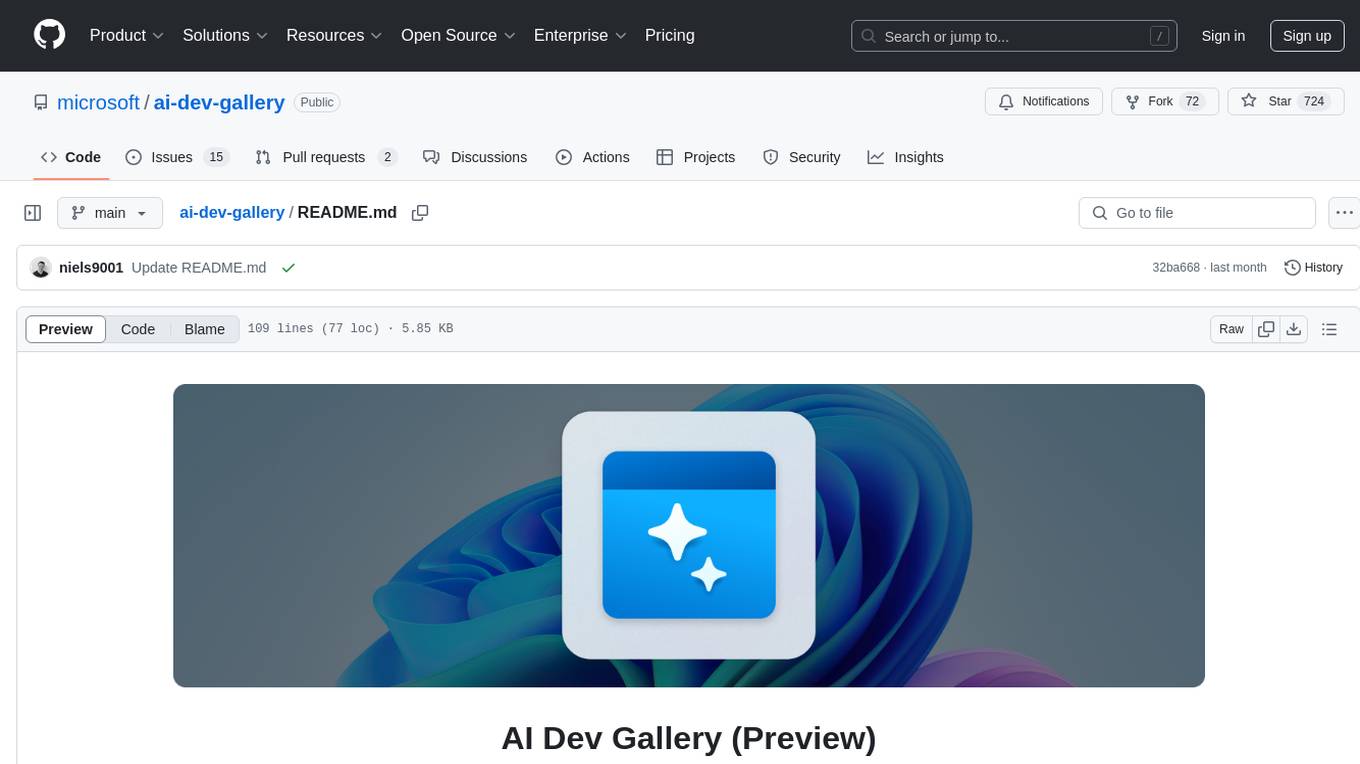
ai-dev-gallery
The AI Dev Gallery is an app designed to help Windows developers integrate AI capabilities within their own apps and projects. It contains over 25 interactive samples powered by local AI models, allows users to explore, download, and run models from Hugging Face and GitHub, and provides the ability to view the C# source code and export a standalone Visual Studio project for each sample. The app is open-source and welcomes contributions and suggestions from the community.
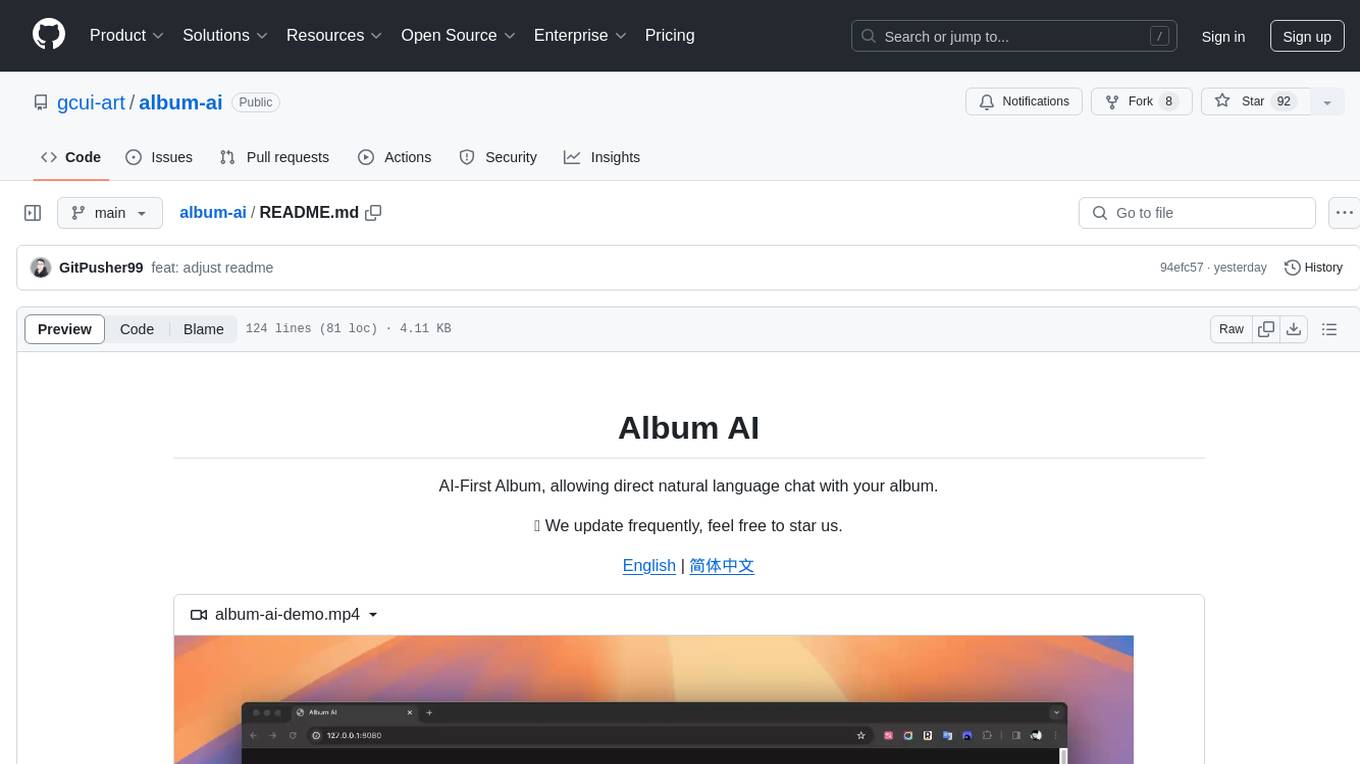
album-ai
Album AI is an experimental project that uses GPT-4o-mini to automatically identify metadata from image files in the album. It leverages RAG technology to enable conversations with the album, serving as a photo album or image knowledge base to assist in content generation. The tool provides APIs for search and chat functionalities, supports one-click deployment to platforms like Render, and allows for integration and modification under a permissive open-source license.
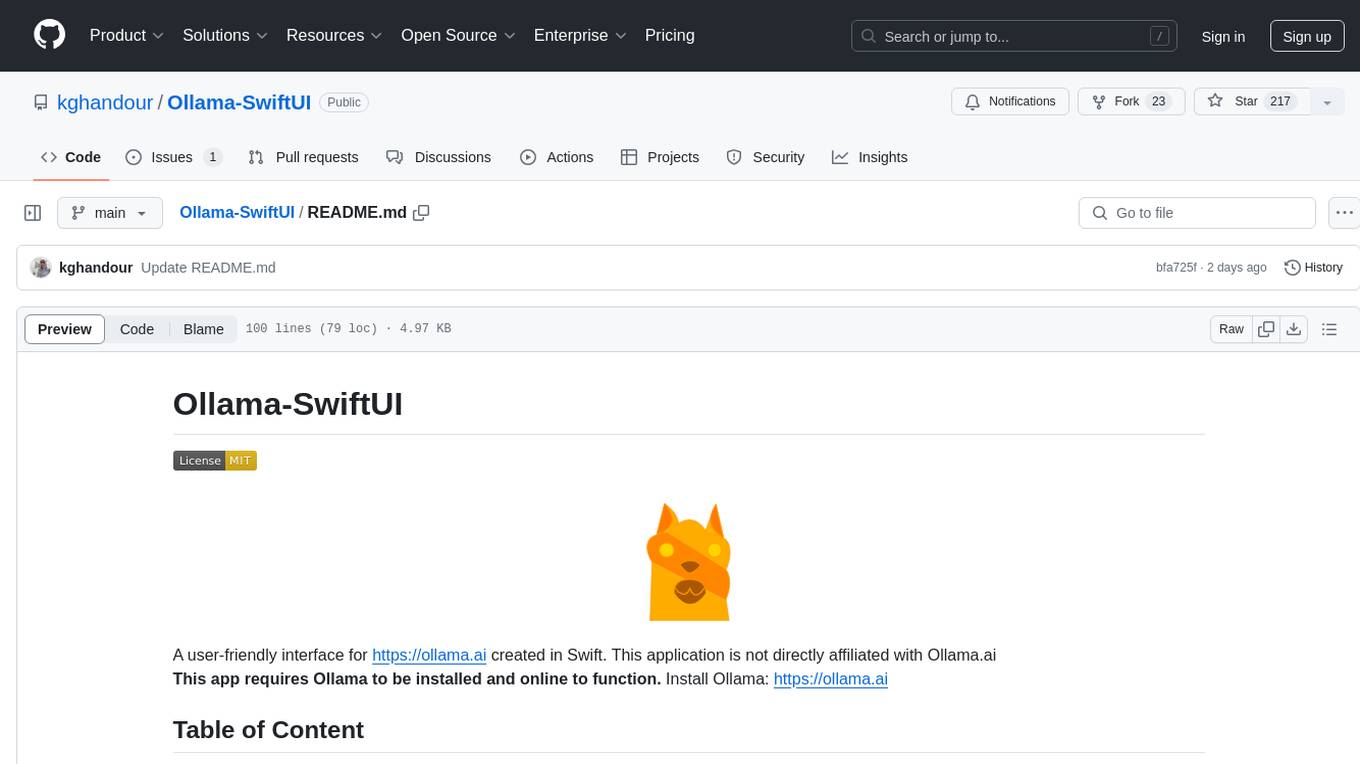
Ollama-SwiftUI
Ollama-SwiftUI is a user-friendly interface for Ollama.ai created in Swift. It allows seamless chatting with local Large Language Models on Mac. Users can change models mid-conversation, restart conversations, send system prompts, and use multimodal models with image + text. The app supports managing models, including downloading, deleting, and duplicating them. It offers light and dark mode, multiple conversation tabs, and a localized interface in English and Arabic.
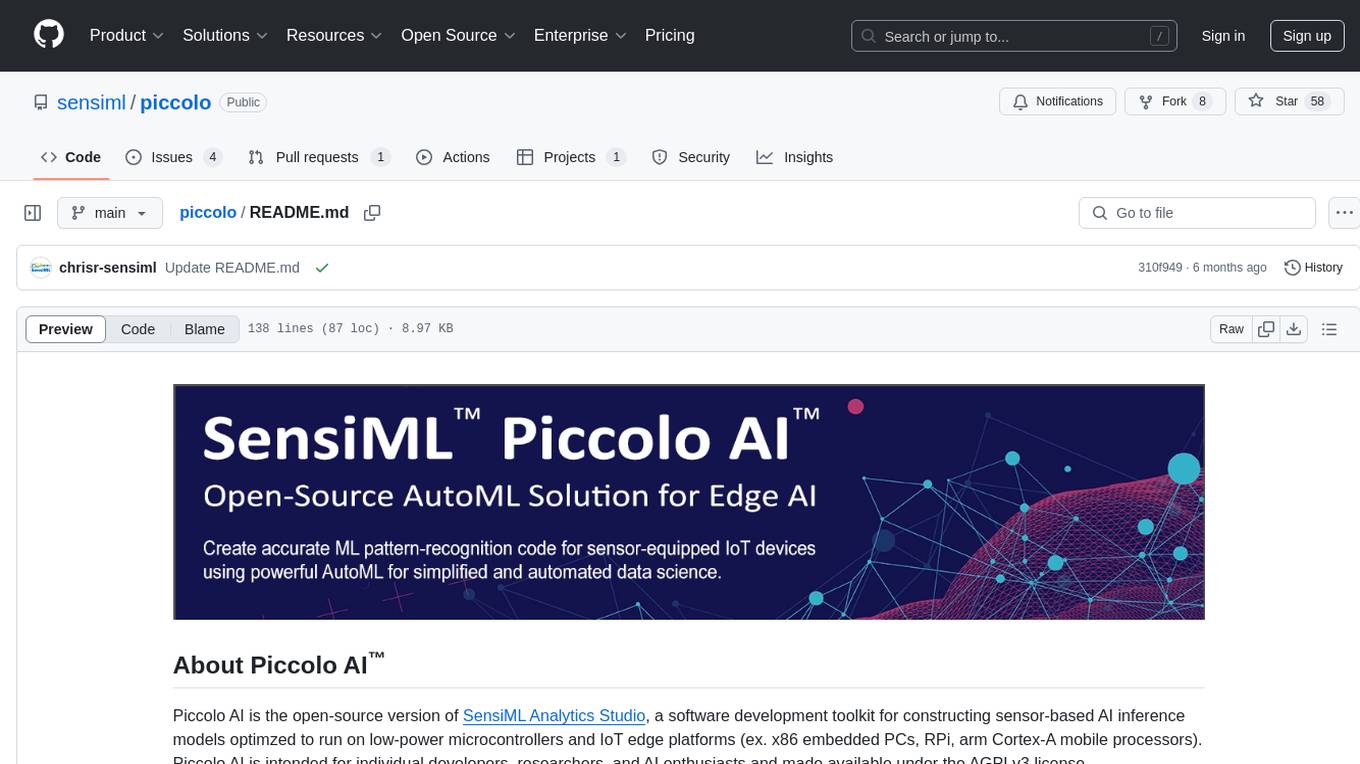
piccolo
Piccolo AI is an open-source software development toolkit for constructing sensor-based AI inference models optimized to run on low-power microcontrollers and IoT edge platforms. It includes SensiML's ML Engine, Embedded ML SDK, Analytic Studio UI, and SensiML Python Client. The tool is intended for individual developers, researchers, and AI enthusiasts, offering support for time-series sensor data classification and various applications such as acoustic event detection, activity recognition, gesture detection, anomaly detection, keyword spotting, and vibration classification.
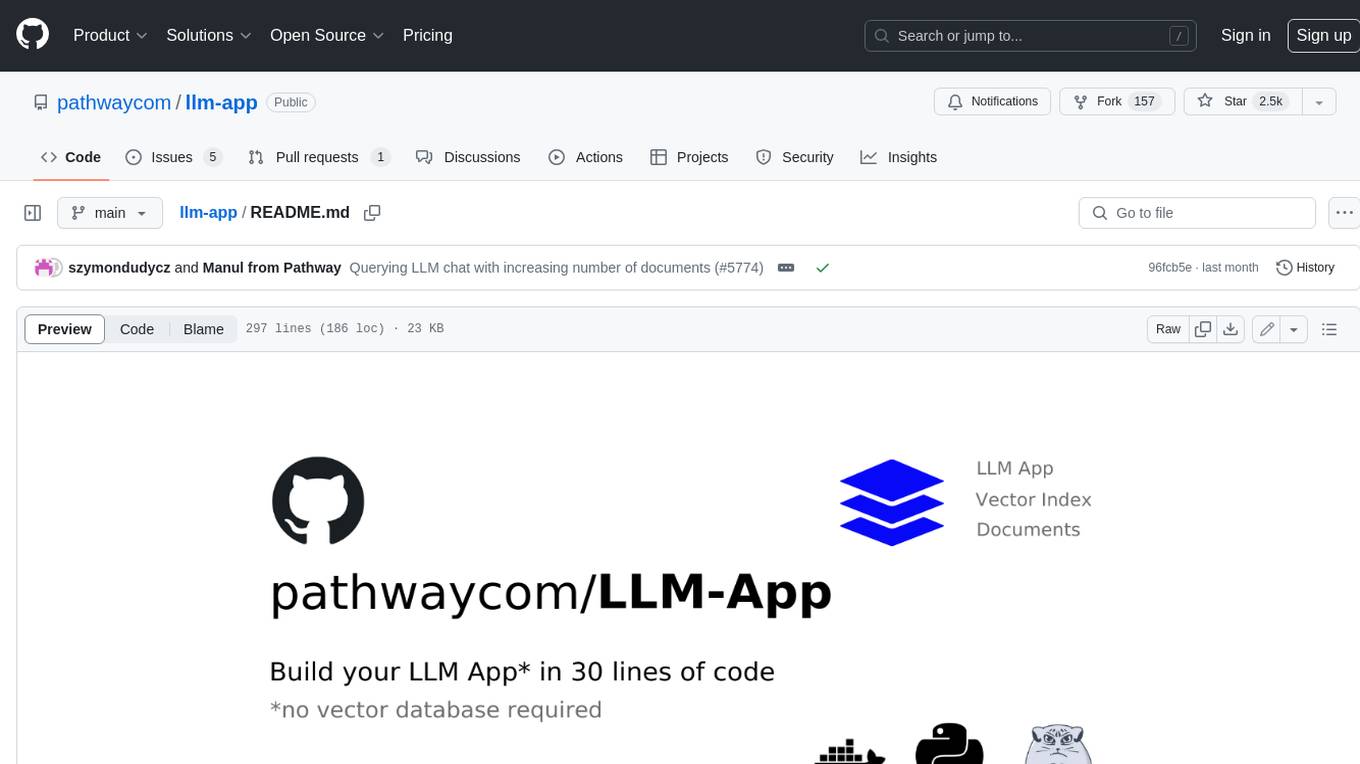
llm-app
Pathway's LLM (Large Language Model) Apps provide a platform to quickly deploy AI applications using the latest knowledge from data sources. The Python application examples in this repository are Docker-ready, exposing an HTTP API to the frontend. These apps utilize the Pathway framework for data synchronization, API serving, and low-latency data processing without the need for additional infrastructure dependencies. They connect to document data sources like S3, Google Drive, and Sharepoint, offering features like real-time data syncing, easy alert setup, scalability, monitoring, security, and unification of application logic.
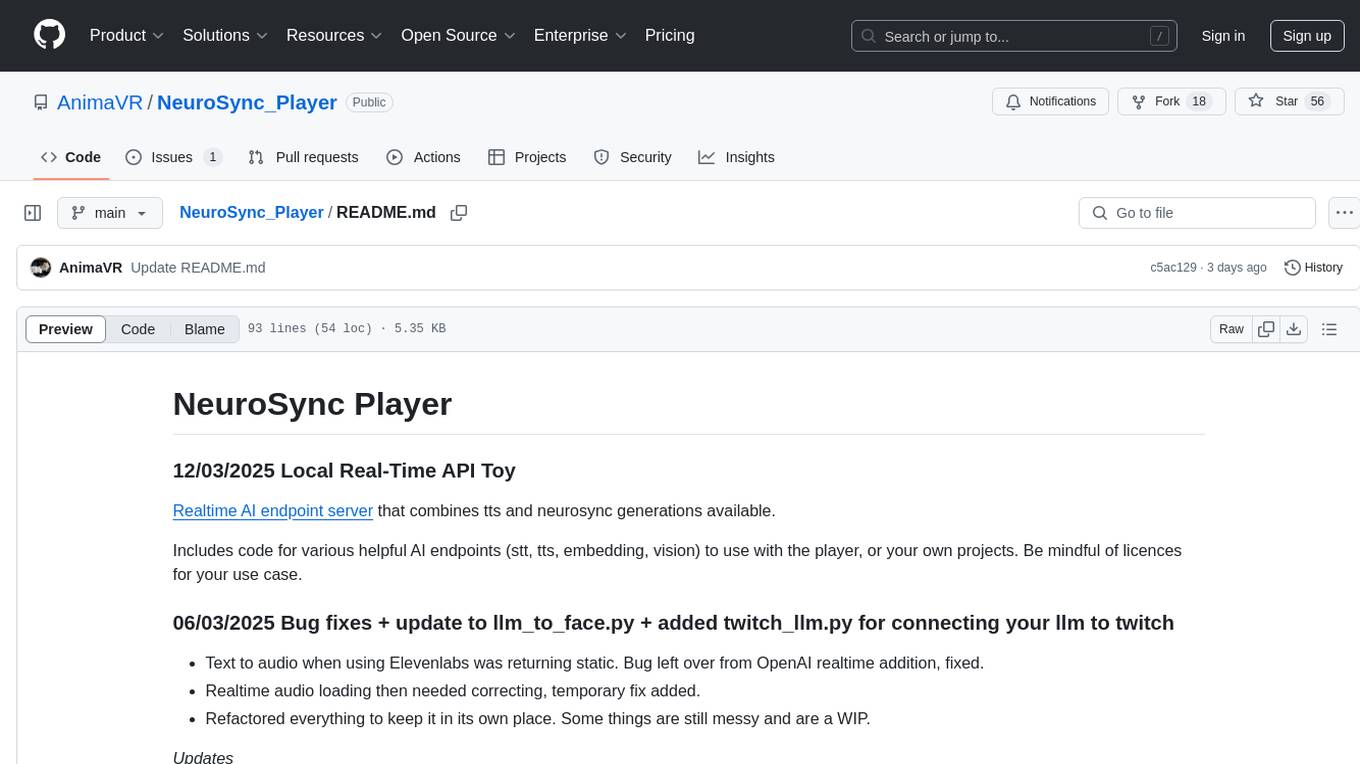
NeuroSync_Player
NeuroSync Player is a real-time AI endpoint server that combines text-to-speech and NeuroSync generations. It includes code for various AI endpoints such as speech-to-text, text-to-speech, embedding, and vision. The tool allows users to connect their llm to Twitch and YouTube, enabling the llm-powered metahuman to respond to viewers in real-time. Additionally, it offers features like push-to-talk, face animation integration, and support for blendshapes generated from audio inputs for Unreal Engine 5. Users can train and fine-tune their own models using NeuroSync Trainer Lite, with simplified loss functions and mixed precision for faster training. The tool also supports data augmentation to help with fine detail reproduction.
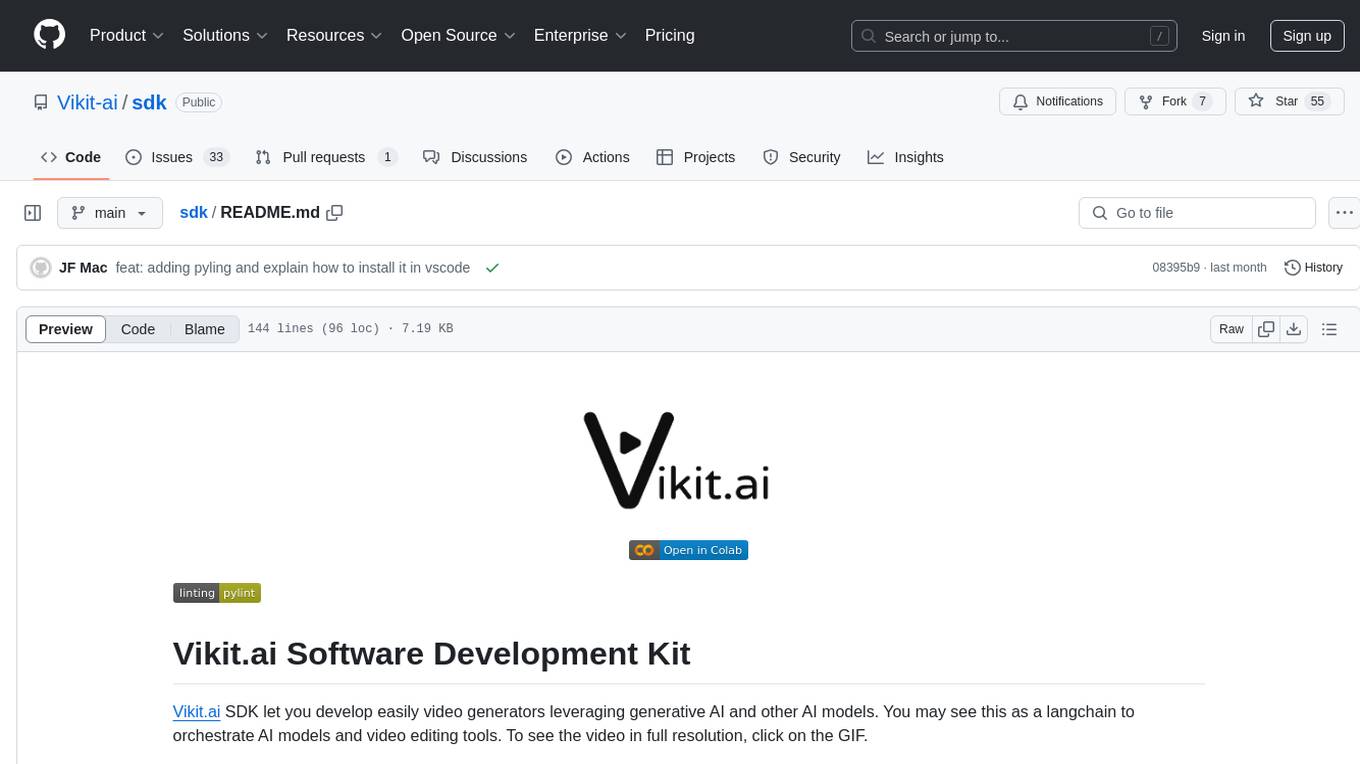
sdk
Vikit.ai SDK is a software development kit that enables easy development of video generators using generative AI and other AI models. It serves as a langchain to orchestrate AI models and video editing tools. The SDK allows users to create videos from text prompts with background music and voice-over narration. It also supports generating composite videos from multiple text prompts. The tool requires Python 3.8+, specific dependencies, and tools like FFMPEG and ImageMagick for certain functionalities. Users can contribute to the project by following the contribution guidelines and standards provided.
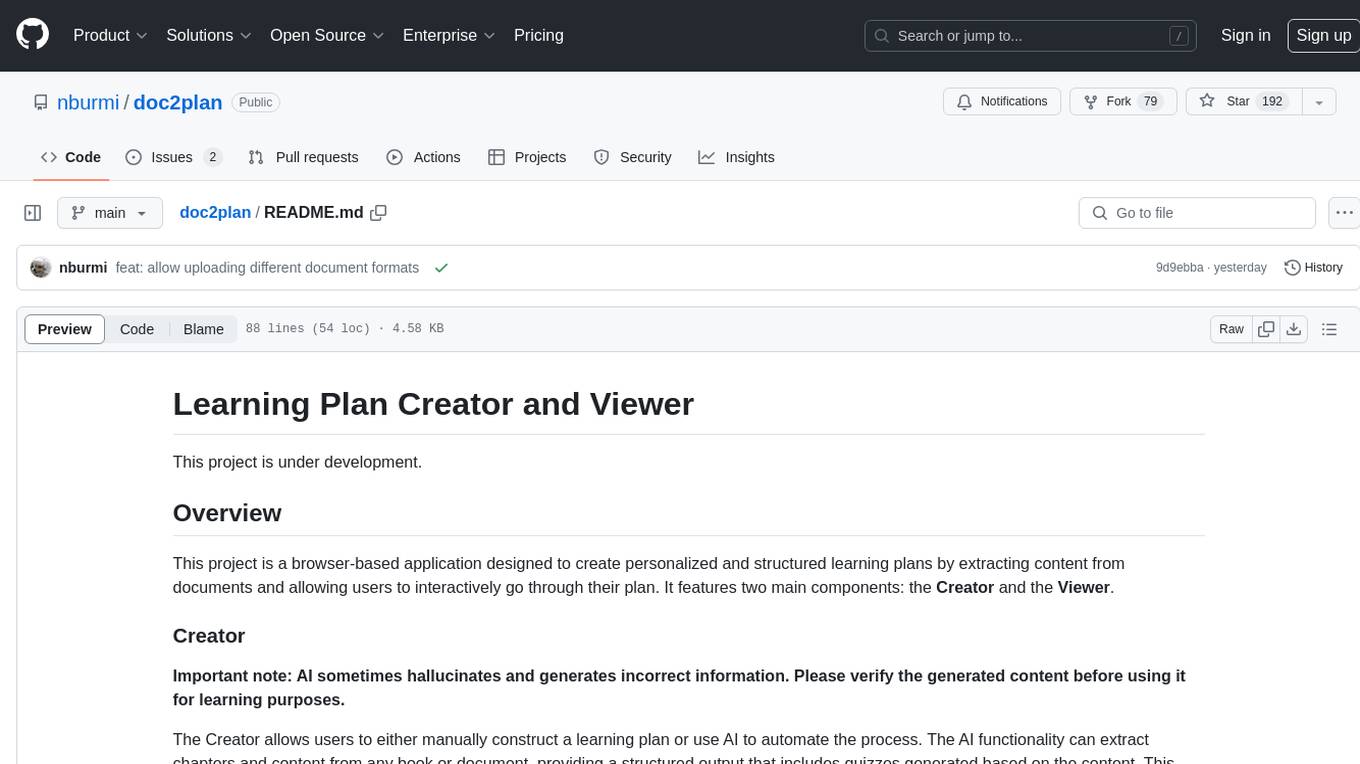
doc2plan
doc2plan is a browser-based application that helps users create personalized learning plans by extracting content from documents. It features a Creator for manual or AI-assisted plan construction and a Viewer for interactive plan navigation. Users can extract chapters, key topics, generate quizzes, and track progress. The application includes AI-driven content extraction, quiz generation, progress tracking, plan import/export, assistant management, customizable settings, viewer chat with text-to-speech and speech-to-text support, and integration with various Retrieval-Augmented Generation (RAG) models. It aims to simplify the creation of comprehensive learning modules tailored to individual needs.
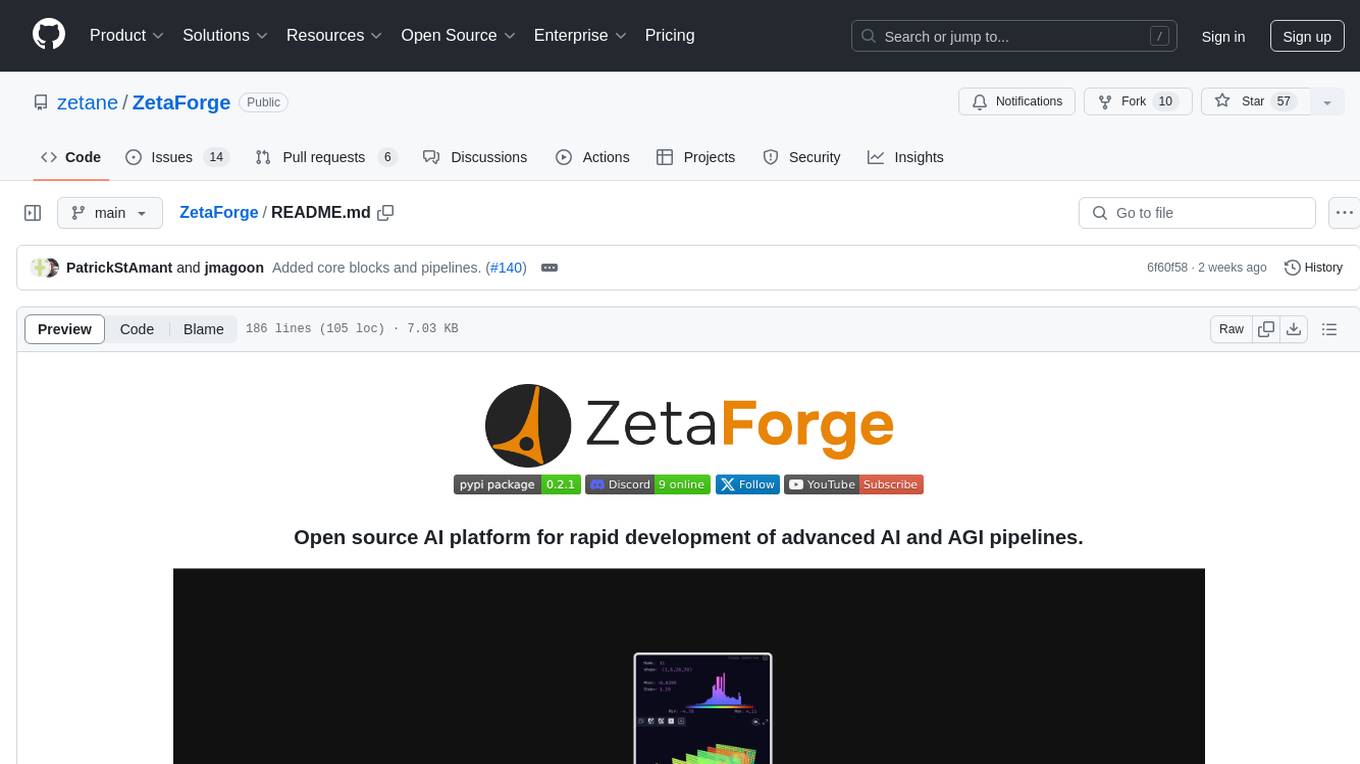
ZetaForge
ZetaForge is an open-source AI platform designed for rapid development of advanced AI and AGI pipelines. It allows users to assemble reusable, customizable, and containerized Blocks into highly visual AI Pipelines, enabling rapid experimentation and collaboration. With ZetaForge, users can work with AI technologies in any programming language, easily modify and update AI pipelines, dive into the code whenever needed, utilize community-driven blocks and pipelines, and share their own creations. The platform aims to accelerate the development and deployment of advanced AI solutions through its user-friendly interface and community support.
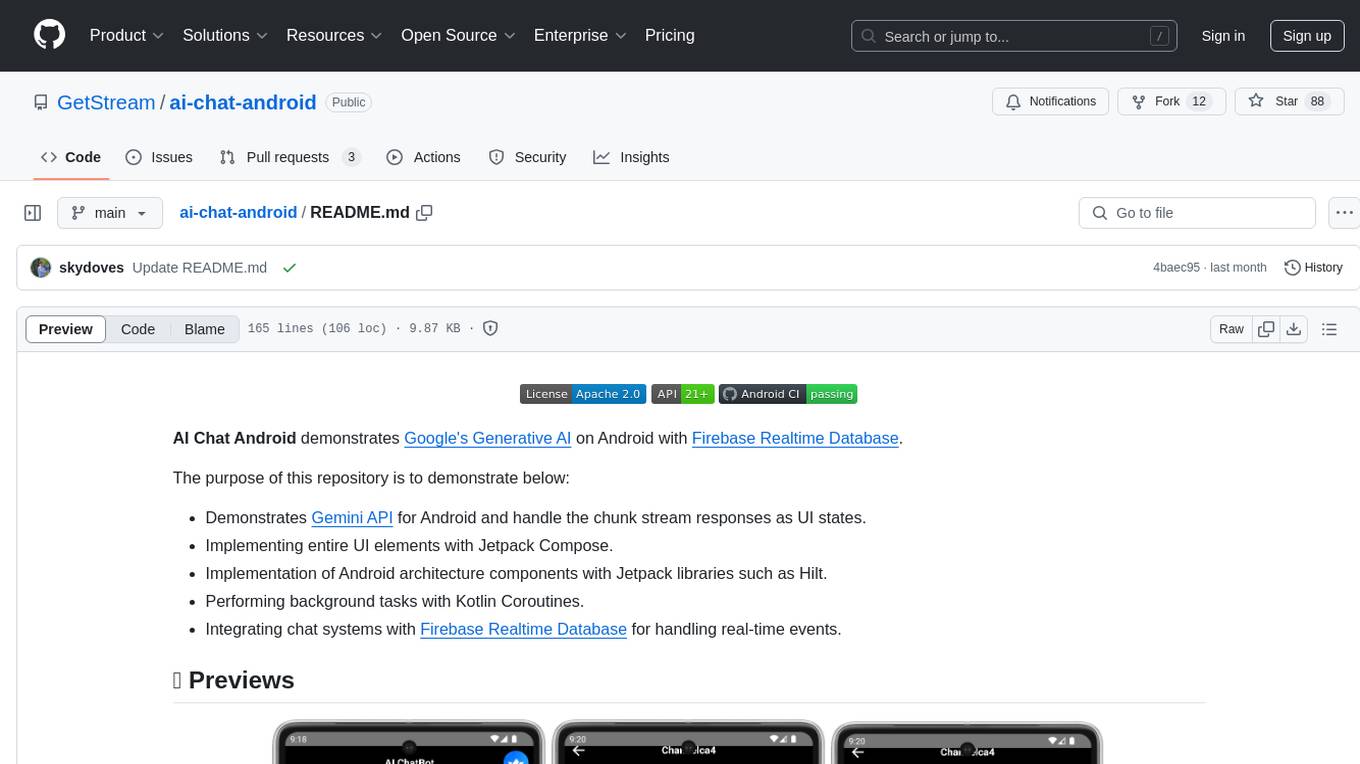
ai-chat-android
AI Chat Android demonstrates Google's Generative AI on Android with Firebase Realtime Database. It showcases Gemini API integration, Jetpack Compose UI elements, Android architecture components with Hilt, Kotlin Coroutines for background tasks, and Firebase Realtime Database integration for real-time events. The project follows Google's official architecture guidance with a modularized structure for reusability, parallel building, and decentralized focusing.

supervisely
Supervisely is a computer vision platform that provides a range of tools and services for developing and deploying computer vision solutions. It includes a data labeling platform, a model training platform, and a marketplace for computer vision apps. Supervisely is used by a variety of organizations, including Fortune 500 companies, research institutions, and government agencies.
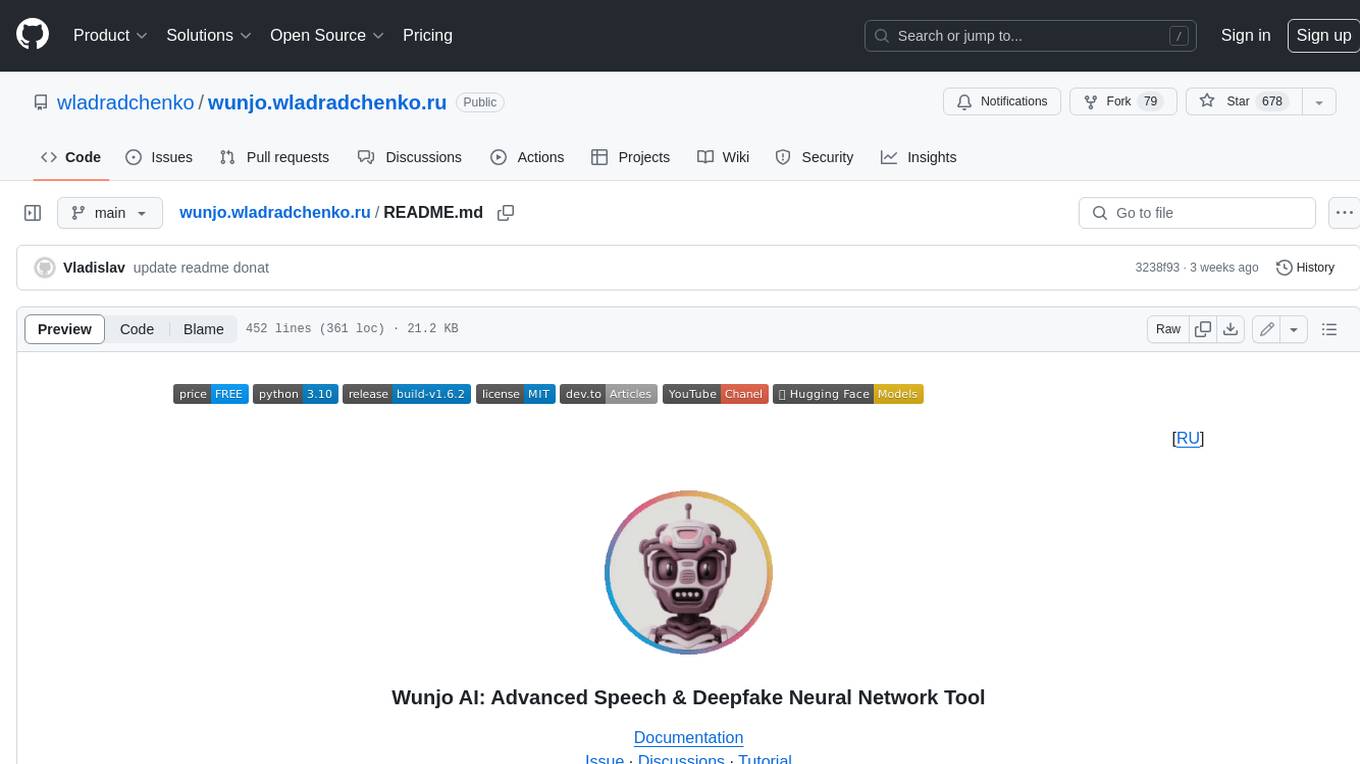
wunjo.wladradchenko.ru
Wunjo AI is a comprehensive tool that empowers users to explore the realm of speech synthesis, deepfake animations, video-to-video transformations, and more. Its user-friendly interface and privacy-first approach make it accessible to both beginners and professionals alike. With Wunjo AI, you can effortlessly convert text into human-like speech, clone voices from audio files, create multi-dialogues with distinct voice profiles, and perform real-time speech recognition. Additionally, you can animate faces using just one photo combined with audio, swap faces in videos, GIFs, and photos, and even remove unwanted objects or enhance the quality of your deepfakes using the AI Retouch Tool. Wunjo AI is an all-in-one solution for your voice and visual AI needs, offering endless possibilities for creativity and expression.
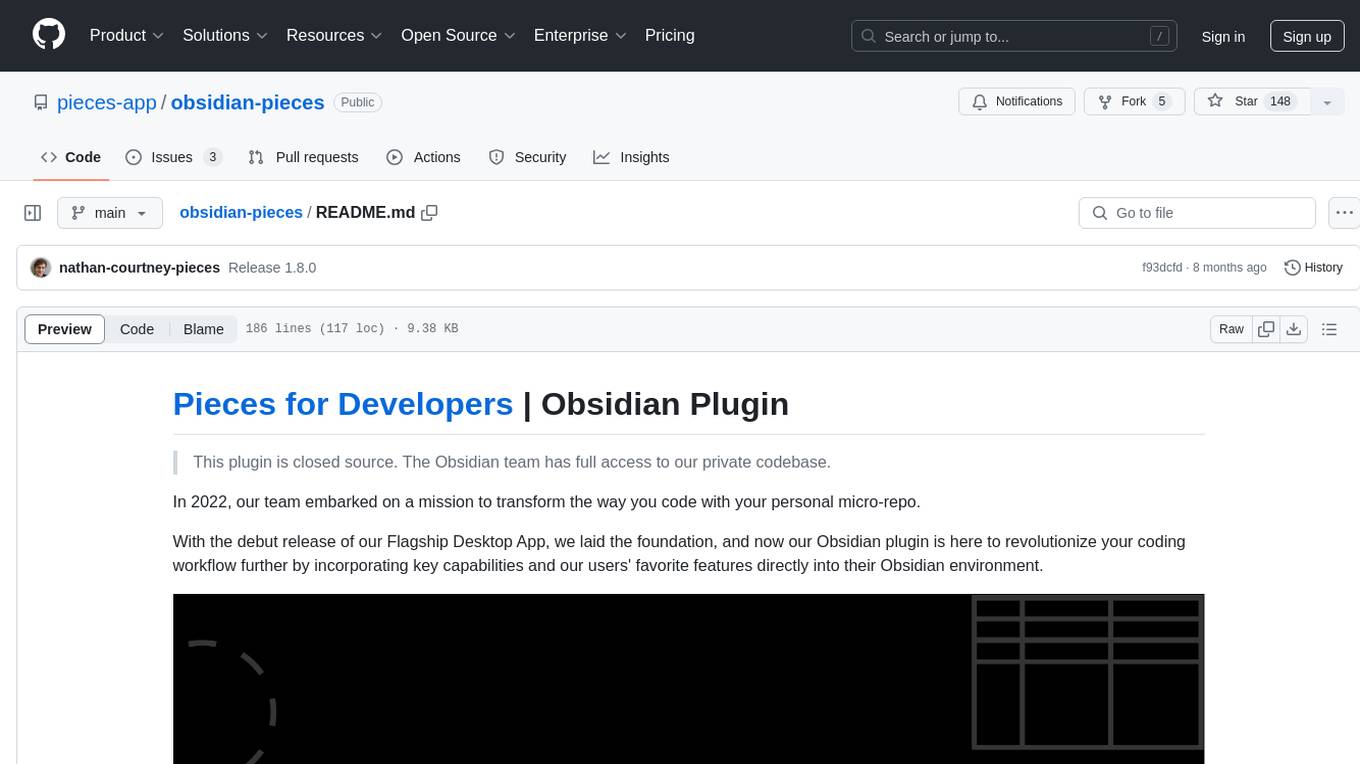
obsidian-pieces
Pieces for Developers is a closed-source Obsidian plugin designed to revolutionize coding workflows by incorporating key capabilities and favorite features directly into the Obsidian environment. The plugin, Pieces Copilot for Obsidian, enhances coding and problem-solving experiences by providing insights on code snippets, generating samples, and facilitating navigation through PRs. Users can capture, manage, share, and discover code snippets and developer materials with ease, bringing efficiency and organization to their coding experience.
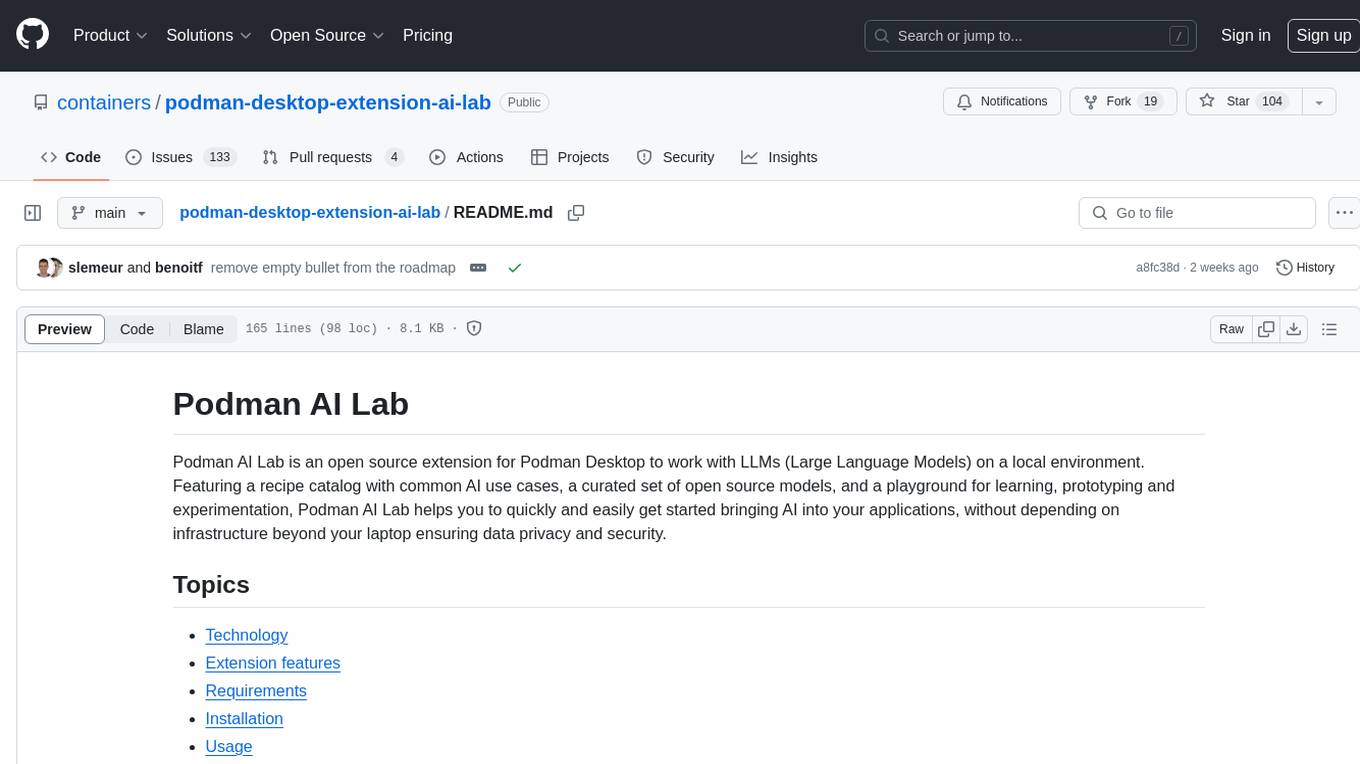
podman-desktop-extension-ai-lab
Podman AI Lab is an open source extension for Podman Desktop designed to work with Large Language Models (LLMs) on a local environment. It features a recipe catalog with common AI use cases, a curated set of open source models, and a playground for learning, prototyping, and experimentation. Users can quickly and easily get started bringing AI into their applications without depending on external infrastructure, ensuring data privacy and security.
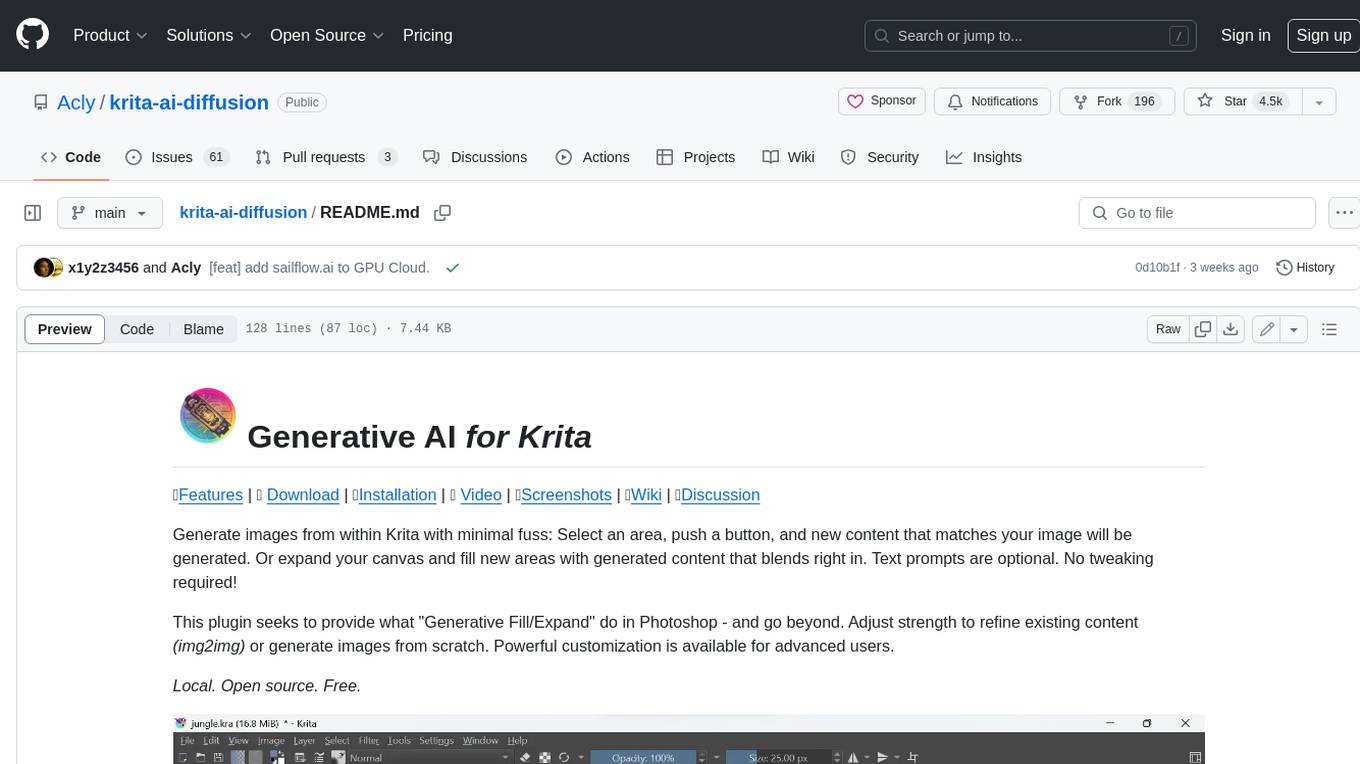
krita-ai-diffusion
Krita-AI-Diffusion is a plugin for Krita that allows users to generate images from within the program. It offers a variety of features, including inpainting, outpainting, generating images from scratch, refining existing content, live painting, and control over image creation. The plugin is designed to fit into an interactive workflow where AI generation is used as just another tool while painting. It is meant to synergize with traditional tools and the layer stack.
For similar tasks

Azure-OpenAI-demos
Azure OpenAI demos is a repository showcasing various demos and use cases of Azure OpenAI services. It includes demos for tasks such as image comparisons, car damage copilot, video to checklist generation, automatic data visualization, text analytics, and more. The repository provides a wide range of examples on how to leverage Azure OpenAI for different applications and industries.
For similar jobs

sweep
Sweep is an AI junior developer that turns bugs and feature requests into code changes. It automatically handles developer experience improvements like adding type hints and improving test coverage.

teams-ai
The Teams AI Library is a software development kit (SDK) that helps developers create bots that can interact with Teams and Microsoft 365 applications. It is built on top of the Bot Framework SDK and simplifies the process of developing bots that interact with Teams' artificial intelligence capabilities. The SDK is available for JavaScript/TypeScript, .NET, and Python.

ai-guide
This guide is dedicated to Large Language Models (LLMs) that you can run on your home computer. It assumes your PC is a lower-end, non-gaming setup.

classifai
Supercharge WordPress Content Workflows and Engagement with Artificial Intelligence. Tap into leading cloud-based services like OpenAI, Microsoft Azure AI, Google Gemini and IBM Watson to augment your WordPress-powered websites. Publish content faster while improving SEO performance and increasing audience engagement. ClassifAI integrates Artificial Intelligence and Machine Learning technologies to lighten your workload and eliminate tedious tasks, giving you more time to create original content that matters.

chatbot-ui
Chatbot UI is an open-source AI chat app that allows users to create and deploy their own AI chatbots. It is easy to use and can be customized to fit any need. Chatbot UI is perfect for businesses, developers, and anyone who wants to create a chatbot.

BricksLLM
BricksLLM is a cloud native AI gateway written in Go. Currently, it provides native support for OpenAI, Anthropic, Azure OpenAI and vLLM. BricksLLM aims to provide enterprise level infrastructure that can power any LLM production use cases. Here are some use cases for BricksLLM: * Set LLM usage limits for users on different pricing tiers * Track LLM usage on a per user and per organization basis * Block or redact requests containing PIIs * Improve LLM reliability with failovers, retries and caching * Distribute API keys with rate limits and cost limits for internal development/production use cases * Distribute API keys with rate limits and cost limits for students

uAgents
uAgents is a Python library developed by Fetch.ai that allows for the creation of autonomous AI agents. These agents can perform various tasks on a schedule or take action on various events. uAgents are easy to create and manage, and they are connected to a fast-growing network of other uAgents. They are also secure, with cryptographically secured messages and wallets.

griptape
Griptape is a modular Python framework for building AI-powered applications that securely connect to your enterprise data and APIs. It offers developers the ability to maintain control and flexibility at every step. Griptape's core components include Structures (Agents, Pipelines, and Workflows), Tasks, Tools, Memory (Conversation Memory, Task Memory, and Meta Memory), Drivers (Prompt and Embedding Drivers, Vector Store Drivers, Image Generation Drivers, Image Query Drivers, SQL Drivers, Web Scraper Drivers, and Conversation Memory Drivers), Engines (Query Engines, Extraction Engines, Summary Engines, Image Generation Engines, and Image Query Engines), and additional components (Rulesets, Loaders, Artifacts, Chunkers, and Tokenizers). Griptape enables developers to create AI-powered applications with ease and efficiency.


